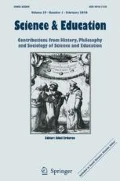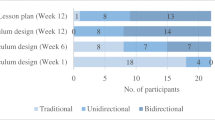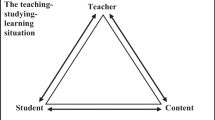Abstract
The work presented here represents a preliminary effort undertaken to address the role of teachers in supporting students’ learning and decision-making about socioscientific issues (SSI) by characterizing preservice elementary teachers’ critique and adaptation of SSI-based science curriculum materials and identifying factors that serve to mediate this process. Four undergraduate preservice elementary teachers were studied over the course of one semester. Results indicate that the teachers navigated multiple learning goals, as well as their own subject-matter knowledge, informal reasoning about SSI, and role identity, in their critique and adaptation of SSI-oriented science instructional materials. Implications for science teacher education and the design of curriculum materials in respect to SSI are discussed.

Similar content being viewed by others

References
Aikenhead G (1994) Consequences to learning science through STS: a research perspective. In: Solomon J, Aikenhead G (eds) STS education: international perspectives on reform. Teachers College Press, New York, pp 169–186
American Association for the Advancement of Science (AAAS) (1993) Benchmarks for science literacy, Project 2061. Oxford University Press, New York
Anderson RD, Mitchener CP (1994) Research on science teacher education. In: Gabel DL (ed) Handbook of research on science teaching and learning. Macmillan, New York, pp 3–34
Appleton K, Kindt I (2002) Beginning elementary teachers’ development as teachers of science. J Sci Teach Educ 13(1):43–61
Ball D, Cohen DK (1996) Reform by the book: what is—or might be—the role of curriculum materials in teacher learning and instructional reform? Educ Res 25(9):6–8
Barab S, Luehmann A (2003) Building sustainable science curriculum: acknowledging and accommodating local adaptation. Sci Educ 87(4):454–467
Barab S, Roth W-M (2006) Curriculum-based ecosystems: supporting knowing from an ecological perspective. Educ Res 35(5):3–13
Barrett SE, Pedretti E (2006) Contrasting orientations: STSE for social reconstruction or social reproduction? Sch Sci Math 106(5):237–247
Baumgartner E (2004) Synergy research and knowledge integration: customizing activities around stream ecology. In: Linn MC, Davis EA, Bell P (eds) Internet environments for science education. Lawrence Erlbaum Associates, Mahwah, NJ, pp 261–287
Brown M, Edelson D (2003) Teaching as design: can we better understand the ways in which teachers use materials so we can better design materials to support their changes in practice? (Design brief). The Center for Learning Technologies in Urban Schools, Evanston, IL
Bullough RV Jr, Knowles JG, Crow NA (1992) Emerging as a teacher. Routledge, New York
Cochran K, Jones L (1998) The subject matter knowledge of preservice science teachers. In: Fraser BJ, Tobin KG (eds) International handbook of science education. Kluwer Academic Publishers, Great Britain, pp 707–718
Crawford BA (2000) Embracing the essence of inquiry: new roles for science teachers. J Res Sci Teach 37(9):916–937
Crawford BA (1999) Is it realistic to expect a preservice teacher to create an inquiry-based classroom? J Sci Teach Educ 10(3):175–194
Crawford B, Marx R, Krajcik J (1999) Developing collaboration in a middle school project-based science classroom. Sci Educ 83(6):701–723
Davis EA (2006) Preservice elementary teachers’ critique of instructional materials for science. Sci Educ 90(2):348–375
Davis EA, Krajcik J (2005) Designing educative curriculum materials to promote teacher learning. Educ Res 34(3):3–14
Davis EA, Petish D, Smithey J (2006) Challenges new science teachers face. Rev Educ Res 76(4):607–651
DeBoer GE (1991) A history of ideas in science education: implications for practice. Teachers College Press, New York
Eick C, Reed C (2002) What makes an inquiry-oriented science teacher? The influence of learning histories on student teacher role identity and practice. Sci Educ 86(3):401–416
Engeström Y (1987) Learning by expanding: an activity-theoretical approach to developmental research. Orienta-Konsultit, Helsinki
Enyedy N, Goldberg J, Welsh KM (2006) Complex dilemmas of identity and practice. Sci Educ 90:68–93
Fishman B, Marx R, Best S, Tal R (2003) Linking teacher and student learning to improve professional development in systemic reform. Teach Teach Educ 19(6):643–658
Greeno J, The Middle School Mathematics Through Application Project Group (1998) The situativity of knowing, learning, and research. Am Psychol 53(1):5–26
Hodson D (2003) Time for action: science education for an alternative future. Int J Sci Educ 25(6):645–670
Howes EV (2002) Learning to teach science for all in the elementary grades: What do preservice teachers bring? J Res Sci Teach 39(9):845–869
Hughes G (2000) Marginalization of socioscientific material in science-technology-society science curricula: some implications for gender inclusively and curriculum reform. J Res Sci Teach 37(5):426–440
Interstate New Teacher Assessment and Support Consortium (INTASC) (1992) Models standards for beginning teacher licensing and development: a resource for state dialogue. Council of Chief State School Officers, Washington, DC
Kolsto SD (2001) Scientific literacy for citizenship: tools for dealing with the science dimension of controversial socioscientific issues. Sci Educ 85:291–310
Lederman NG (1992) Students’ and teachers’ conceptions of the nature of science: a review of the research. J Res Sci Teach 29(4):331–359
Lester BT, Ma L, Lee O, Lambert J (2006) Social activism in elementary science education: a science, technology, and society approach to teach global warming. Int J Sci Educ 28(4):315–339
Magnusson S, Krajcik J, Borko H (1999) Nature, sources, and development of pedagogical content knowledge for science teaching. In: Gess-Newsome J, Lederman N (eds) Examining pedagogical content knowledge: the construct and its implications for science education. Kluwer Academic Publishers, The Netherlands, pp 95–132
Miles MB, Huberman AM (1994) Qualitative data analysis. Sage, Thousand Oaks
National Council for Accreditation of Teacher Education (NCATE) (1987) NCATE standards, procedures, and policies for the accreditation of professional education units: the accreditation of professional education units for the preparation of professional school personnel at basic and advanced levels. National Council for Accreditation of Teacher Education, Washington, DC
National Council for the Social Studies (NCSS) (1994) Expectations of excellence: curriculum standards for social studies. National Council for the Social Studies, Washington, DC
National Council of Teachers of Mathematics (NCTM) (1991) Professional teaching standards for teaching mathematics. National Council of Teachers of Mathematics, Reston, VA
National Research Council (NRC) (1996) National science education standards. National Research Council, Washington, DC
Oulton C, Dillon J, Grace MM (2004) Reconceptualizing the teaching of controversial issues. Int J Sci Educ 26(4):411–423
Pedretti E, Hodson D (1995) From rhetoric to action: implementing STS education through action research. J Res Sci Teach 32(5):463–485
Peterson RF, Treagust DF (1998) Learning to teach primary science through problem-based learning. Sci Educ 82(2):215–237
Remillard JT (2005) Examining key concepts in research on teachers’ use of mathematics curricula. Rev Educ Res 75(2):211–246
Remillard JT, Bryans MB (2004) Teachers’ orientations toward mathematics curriculum materials: implications for teacher learning. J Res Math Educ 35(5):352–358
Remillard JT (1999) Curriculum materials in mathematics education reform: a framework for examining teachers’ curriculum development. Curricul Inquiry 19(3):315–342
Rice DC, Roychoudhury A (2003) Preparing more confident preservice elementary science teachers: one elementary science methods teacher’s self-study. J Sci Teach Educ 14(2):97–126
Sadler TD (2006) Promoting discourse and argumentation in science teacher education. J Sci Teach Educ 17(4):323–346
Sadler TD, Amirshokoohi A, Kazempour M, Allspaw KM (2006) Socioscience and ethics in science classrooms: teacher perspectives and strategies. J Res Sci Teach 43(4):353–376
Sadler TD, Zeidler DL (2005a) Patterns of informal reasoning in the context of socioscientific decision making. J Res Sci Teach 42(1):112–138
Sadler TD, Zeidler DL (2005b) The significance of content knowledge for informal reasoning regarding socioscientific issues: applying genetics knowledge to genetic engineering issues. Sci Educ 89(1):71–93
Sadler TD (2004a) Moral sensitivity and its contribution to the resolution of socio-scientific issues. J Moral Educ 33:339–358
Sadler TD (2004b) Informal reasoning regarding socioscientific issues: a critical review of research. J Res Sci Teach 41:513–536
Sadler TD, Zeidler DL (2004) The morality of socioscientific issues: construal and resolution of genetic engineering dilemmas. Sci Educ 88:4–27
Schneider RM, Krajcik J, Blumenfeld P (2005) Enacting reformed-based science materials. The range of teacher enactments in reform classrooms. J Res Sci Teach 42(3):283–312
Schneider RM, Krajcik J (2002) Supporting science teacher learning: the role of educative curriculum materials. J Sci Teach Educ 13(3):221–245
Seethaler S, Linn M (2004) Genetically modified food in perspective: an inquiry-based curriculum to help middle school students make sense of tradeoffs. Int J Sci Educ 26(14):1765–1785
Shulman L (1986) Those who understand: knowledge growth in teaching. Educ Res 15(2):4–14
Singer J, Marx RW, Kracik J, Clay Chambers J (2000) Constructing extended inquiry projects: curriculum materials for science education reform. Educ Psychol 35(3):165–178
Smith LK, Gess-Newsome J (2004) Elementary science methods courses and the National Science Education Standards: are we adequately preparing teachers? J Sci Teach Educ 15(2):91–110
Smith DC, Neale DC (1989) The construction of subject matter knowledge in primary science teaching. Teach Teach Educ 5(1):1–20
Spillane JP, Diamond JB, Walker L, Halverson R, Jita L (2001) Urban school leadership and elementary science instruction: identifying, mobilizing, and activating resources in a devalued subject area. J Res Sci Teach 38(8):918–940
Squire K, MaKinster J, Barnett M, Luehmann A, Barab S (2003) Designed curriculum and local culture: acknowledging the primacy of classroom culture. Sci Educ 87(4):468–489
Stevens R, Wineburg S, Herrenkohl LR, Bell P (2005) Comparative understandings of school subjects: past, present, and future. Rev Educ Res 75(2):125–157
Turner S, Sullenger K (1999) Kuhn in the classroom, Lakatos in the lab: science educators confront the nature-of-science debate. Sci Technol Hum Values 24(1):5–30
Vygotsky LS (1978) Mind in society: the development of higher psychological processes. Harvard University Press, Cambridge, MA
Zeidler DL, Sadler TD, Applebaum S, Callahan B, Amiri L (2005) Socioscientific issues in secondary school science: students’ epistemological conceptions of content, NOS, and ethical sensitivity. Paper presented at the Annual Meeting of the National Association for Research in Science Teaching, Dallas, TX
Author information
Authors and Affiliations
Corresponding author
Appendices
Appendices
Appendix A—Interview protocol
Reference lesson plan
-
1.
Describe what you do when you come across a new science lesson for the first time. How do you decide if you’ll use it and, if so, how you’ll use it?
-
2.
What do you think about modifying science lessons? When you do change lessons before teaching them, how do you go about it?
-
3.
Have you ever developed a science lesson from scratch and then taught it? If so, describe the lesson and how you went about doing this.
-
4.
What are your initial thoughts on this lesson?
-
5.
How does this lesson compare to science lessons you taught or observed being taught during your field experiences and/or student teaching?
-
6.
What are some aspects of it you like?
-
7.
What are some aspects of it you like less?
-
8.
What are some management concerns you’d have with this lesson?
-
9.
How does the lesson meet or not meet each of the following criteria? Recall the criteria we used in class for critiquing lessons.
-
a.
Questioning and predicting
-
b.
Making explanations using evidence
-
c.
Communicating and justifying findings
-
d.
Anticipating and dealing with students’ ideas
-
a.
-
10.
What might you change about the lesson and why? How would you rate the relative importance of the changes you suggested?
Read scenario
-
11.
What is your immediate personal response to Alex’s comments?
-
12.
Do you believe humans are more important than other forms of life? Explain.
-
13.
Do you think environmental issues are important? Why or why not?
-
14.
Do you think morals or ethics should play a role in how we address environmental issues? Why or why not?
-
15.
What do you want your students to understand about environmental issues? Why?
-
16.
Why do you think environmental issues are so controversial?
-
17.
How would you respond to Alex’s comment and wrap-up the lesson?
-
18.
Does this scenario change your initial opinion of the lesson?
-
19.
Do you think your own beliefs and values affect how you would teach this lesson? How?
-
20.
How might your critique of the lesson change based on the scenario?
Appendix B—Interview lesson
Abstract: Students simulate the flow of energy through a food chain by acting as grasshoppers, shrews, or hawks and “eating” corn sprayed with pesticides.
Standards and Benchmarks: Changes in an organism’s habitat are sometimes beneficial to it and sometimes harmful (AAAS).
Objectives: Students will understand how pesticides and other environmental pollutants can negatively impact a food chain.
Class Time Needed: One forty-five minute period
Student Background: Students need to understand how a food chain operates.
Materials:
-
50–100 Pictures of corn (2/3 yellow, 1/3 another color)
-
Identity cards for each student (1–2 hawks, 3–4 shrews, 9–18 grasshoppers)
-
One paper bag per student
Science Background: Human ecology focuses on the relationship between humans and the environment. Humans can affect the environment in a number of ways including poor farming practices, pollution, and urbanization.
There are many elements that may affect the flow of a food chain. First, any sort of natural disaster can take homes away from animals or leave trees and plants to rot. This may cause less food for the animals to eat and less shelter. A man-made disaster such as an oil spill can wipe out a population of a species of animal and thus the food chain in that environment would not be complete.
Description:
-
1.
Ask students the following question: How would you make a food chain using a shrew, hawk, corn plant, and grasshopper? (The grasshopper eats the corn plant.)
-
2.
Once students have agreed on the food chain, divide the class into three categories: shrew, hawk, or grasshopper.
-
3.
Have students go to the playground. Scatter pictures of corn around this area (some yellow, some non-yellow).
-
4.
Give the “grasshoppers” 15 seconds to collect as much corn as they can in their “stomachs” (paper bags).
-
5.
After 15 seconds, have the “shrew” hunt the “grasshoppers.” Each time the “shrew” tags the “grasshopper,” the “grasshopper” needs to turn over their “stomachs.”
-
6.
After another 15 seconds, have the “hawks” hunt the “shrews.” Each time the “hawk” tags the “shrew,” they must turn over their “stomachs.” Whoever is tagged must sit down.
-
7.
Whoever is left alive will come to the front of the class and dump the contents of their “stomach” on the table. It will be divided into two categories—yellow and not yellow.
-
8.
Record these results on the board.
-
9.
Tell students that the non-yellow corn was sprayed with pesticides. Explain that pesticides help keep the plant alive—but may be harmful to animals.
-
10.
Explain the rules of the game:
-
If a grasshopper’s “stomach” contained any non-yellow corn, that grasshopper is dead from pesticide poisoning.
-
Each shrew that has half or more of their food supply having non-yellow corn would also be considered dead
-
The hawk probably would not die because of this pesticide use, but a large accumulation of pesticide in the hawk’s body may damage the reproductive system (the eggs may have shells that are too thin to survive)
-
-
11.
Ask students the following questions. Have them write their responses in their science journals:
-
Why did the grasshoppers who ate yellow corn die?
-
Why did the shrews who ate the grasshoppers die?
-
Why are the hawks in danger of getting sick from eating the shrews?
-
What are some other ways that humans can hurt an ecosystem?
-
How can we stop some of these things from happening?
-
-
12.
Facilitate a discussion around these questions. Some students may have heard of the destruction of the rainforest or large oil spills that affect the wildlife that live in bodies of water. Students should know that if something lower on the food chain (such as a grasshopper or fish) ingests something harmful then all of the consumers eat it have the potential of getting sick also.
Assessment: Collect students’ journals. Make sure they understand that if something lower on the food chain ingests something that is harmful (like a pesticide), then the consumer that eats it may become sick also.
Rights and permissions
About this article
Cite this article
Forbes, C.T., Davis, E.A. Exploring preservice elementary teachers’ critique and adaptation of science curriculum materials in respect to socioscientific issues. Sci & Educ 17, 829–854 (2008). https://doi.org/10.1007/s11191-007-9080-z
Received:
Accepted:
Published:
Issue Date:
DOI: https://doi.org/10.1007/s11191-007-9080-z



